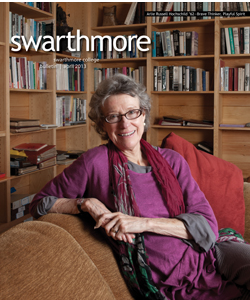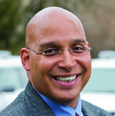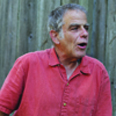By Carol Brévart-Demm

One evening last fall, two students made their way along the path from Wharton Hall to Sharples.
“Look, there’s a hawk,” one of them exclaimed, his face upturned, staring into the skeletal branches of the lofty ginkgo that dominates the hill above the fraternity lodges.
Following his friend’s gaze, the second student looked up, located the bird. Their hefty book bags slithered to the ground, landing with an almost inaudible double thunk. Silently, the two young men observed the magnificent hawk silhouetted motionless on its perch, apparently resting, unperturbed by its audience. For a few moments, the students were transported, taking a break, quietly, like the bird.
By Sherri Kimmel
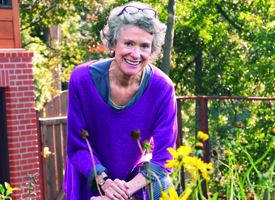
It’s hard to believe it’s been more than 20 years since Arlie Russell Hochschild ’62 coined the term “the second shift” in her eponymous book, subtitled Working Parents and the Revolution at Home. She explored women’s paid work on the job, then, the other, unpaid, after-hours labor—baking cupcakes for our daughters’ next-day school party or making that meeting at the assisted-care facility we’re considering for mom’s next stage of life.
Related Article
By Carrie Compton
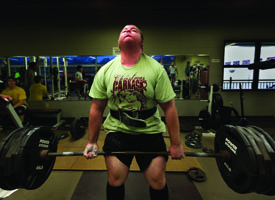
Jake Neely ’13 is used to stares from students and new dining-hall employees as he exits Sharples. On hisoverflowing plate are bunless hamburger patties, mountains of cubed chicken, and spinach—the mainstays of his diet. Proudly, Neely will tell you that diet has taken him to 525 pounds … on the barbell. The Missoula, Mont., native has actually lost 75 pounds on his carnivorous, protein-rich regimen, which, when paired with intense muscle building, helps him maintain a paradoxical balance.
By Mike Agresta
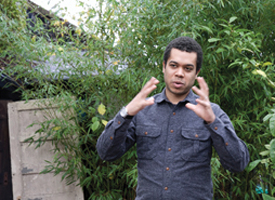
June 9, 2011, was a typical day for Adbusters, the eye-catching Vancouver, British Columbia-based magazine of radical political activism and social commentary. Kalle Lasn, the 70-year-old founder and editor-in-chief, was trading emails with frequent collaborator Micah White ’04, an editor 40 years his junior. The subject was a planned action in Lower Manhattan to protest financial industry excess. White, in an email, suggested a name: Occupy Wall Street (OWS).
By Autumn Quinn ’04
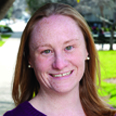
I first heard of Swarthmore through the stories of my father—Rob Elmore ’72. He attended Swarthmore during the upheaval of Vietnam, the student protests, occupancy of the admissions office, and the untimely death of President Courtney Smith.
But when it came time to start my own college search, I began most conversations with, “I’d like a small liberal arts college, not in California, academically challenging, and not Swarthmore.” I initially thought that if I went to Swarthmore my experience would somehow not be my own but would be colored by his experience. Fortunately, I reconsidered.


In the 1920s, novelist Virginia Woolf wrote that war stirs the poet in us—most likely with the Great War (aka World War I) in mind. Rupert Brooke, the brilliant soldier-poet, died young but left prophetic verses that live on: “That there’s some corner of a foreign field/That is for ever England.”
And Woolf was right. Faith Barrett ’87, associate professor and chair of the English department at Lawrence University in Wisconsin, proves that point.
By Charlie Huntington ’12
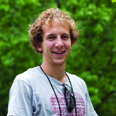
It was only as the plane made a sweeping turn over Cairo proper, and I glimpsed the Nile River, a surprisingly slender blue vein almost lost in the sprawl, that I had my Dorothy moment: I most certainly was not in Swarthmore anymore. I’d spent four years hardly ever leaving Swat, even filling the summer months with on-campus jobs, RA training, and cross-country preseason training. I couldn’t seem to leave the place, and I certainly didn’t want to.
 One evening last fall, two students made their way along the path from Wharton Hall to Sharples.
“Look, there’s a hawk,” one of them exclaimed, his face upturned, staring into the skeletal branches of the lofty ginkgo that dominates the hill above the fraternity lodges.
Following his friend’s gaze, the second student looked up, located the bird. Their hefty book bags slithered to the ground, landing with an almost inaudible double thunk. Silently, the two young men observed the magnificent hawk silhouetted motionless on its perch, apparently resting, unperturbed by its audience. For a few moments, the students were transported, taking a break, quietly, like the bird.
One evening last fall, two students made their way along the path from Wharton Hall to Sharples.
“Look, there’s a hawk,” one of them exclaimed, his face upturned, staring into the skeletal branches of the lofty ginkgo that dominates the hill above the fraternity lodges.
Following his friend’s gaze, the second student looked up, located the bird. Their hefty book bags slithered to the ground, landing with an almost inaudible double thunk. Silently, the two young men observed the magnificent hawk silhouetted motionless on its perch, apparently resting, unperturbed by its audience. For a few moments, the students were transported, taking a break, quietly, like the bird.  It’s hard to believe it’s been more than 20 years since Arlie Russell Hochschild ’62 coined the term “the second shift” in her eponymous book, subtitled Working Parents and the Revolution at Home. She explored women’s paid work on the job, then, the other, unpaid, after-hours labor—baking cupcakes for our daughters’ next-day school party or making that meeting at the assisted-care facility we’re considering for mom’s next stage of life.
It’s hard to believe it’s been more than 20 years since Arlie Russell Hochschild ’62 coined the term “the second shift” in her eponymous book, subtitled Working Parents and the Revolution at Home. She explored women’s paid work on the job, then, the other, unpaid, after-hours labor—baking cupcakes for our daughters’ next-day school party or making that meeting at the assisted-care facility we’re considering for mom’s next stage of life.
 Jake Neely ’13 is used to stares from students and new dining-hall employees as he exits Sharples. On hisoverflowing plate are bunless hamburger patties, mountains of cubed chicken, and spinach—the mainstays of his diet. Proudly, Neely will tell you that diet has taken him to 525 pounds … on the barbell. The Missoula, Mont., native has actually lost 75 pounds on his carnivorous, protein-rich regimen, which, when paired with intense muscle building, helps him maintain a paradoxical balance.
Jake Neely ’13 is used to stares from students and new dining-hall employees as he exits Sharples. On hisoverflowing plate are bunless hamburger patties, mountains of cubed chicken, and spinach—the mainstays of his diet. Proudly, Neely will tell you that diet has taken him to 525 pounds … on the barbell. The Missoula, Mont., native has actually lost 75 pounds on his carnivorous, protein-rich regimen, which, when paired with intense muscle building, helps him maintain a paradoxical balance.  June 9, 2011, was a typical day for Adbusters, the eye-catching Vancouver, British Columbia-based magazine of radical political activism and social commentary. Kalle Lasn, the 70-year-old founder and editor-in-chief, was trading emails with frequent collaborator Micah White ’04, an editor 40 years his junior. The subject was a planned action in Lower Manhattan to protest financial industry excess. White, in an email, suggested a name: Occupy Wall Street (OWS).
June 9, 2011, was a typical day for Adbusters, the eye-catching Vancouver, British Columbia-based magazine of radical political activism and social commentary. Kalle Lasn, the 70-year-old founder and editor-in-chief, was trading emails with frequent collaborator Micah White ’04, an editor 40 years his junior. The subject was a planned action in Lower Manhattan to protest financial industry excess. White, in an email, suggested a name: Occupy Wall Street (OWS).  I first heard of Swarthmore through the stories of my father—Rob Elmore ’72. He attended Swarthmore during the upheaval of Vietnam, the student protests, occupancy of the admissions office, and the untimely death of President Courtney Smith.
But when it came time to start my own college search, I began most conversations with, “I’d like a small liberal arts college, not in California, academically challenging, and not Swarthmore.” I initially thought that if I went to Swarthmore my experience would somehow not be my own but would be colored by his experience. Fortunately, I reconsidered.
I first heard of Swarthmore through the stories of my father—Rob Elmore ’72. He attended Swarthmore during the upheaval of Vietnam, the student protests, occupancy of the admissions office, and the untimely death of President Courtney Smith.
But when it came time to start my own college search, I began most conversations with, “I’d like a small liberal arts college, not in California, academically challenging, and not Swarthmore.” I initially thought that if I went to Swarthmore my experience would somehow not be my own but would be colored by his experience. Fortunately, I reconsidered.

 In the 1920s, novelist Virginia Woolf wrote that war stirs the poet in us—most likely with the Great War (aka World War I) in mind. Rupert Brooke, the brilliant soldier-poet, died young but left prophetic verses that live on: “That there’s some corner of a foreign field/That is for ever England.”
And Woolf was right. Faith Barrett ’87, associate professor and chair of the English department at Lawrence University in Wisconsin, proves that point.
In the 1920s, novelist Virginia Woolf wrote that war stirs the poet in us—most likely with the Great War (aka World War I) in mind. Rupert Brooke, the brilliant soldier-poet, died young but left prophetic verses that live on: “That there’s some corner of a foreign field/That is for ever England.”
And Woolf was right. Faith Barrett ’87, associate professor and chair of the English department at Lawrence University in Wisconsin, proves that point.
 It was only as the plane made a sweeping turn over Cairo proper, and I glimpsed the Nile River, a surprisingly slender blue vein almost lost in the sprawl, that I had my Dorothy moment: I most certainly was not in Swarthmore anymore. I’d spent four years hardly ever leaving Swat, even filling the summer months with on-campus jobs, RA training, and cross-country preseason training. I couldn’t seem to leave the place, and I certainly didn’t want to.
It was only as the plane made a sweeping turn over Cairo proper, and I glimpsed the Nile River, a surprisingly slender blue vein almost lost in the sprawl, that I had my Dorothy moment: I most certainly was not in Swarthmore anymore. I’d spent four years hardly ever leaving Swat, even filling the summer months with on-campus jobs, RA training, and cross-country preseason training. I couldn’t seem to leave the place, and I certainly didn’t want to.
